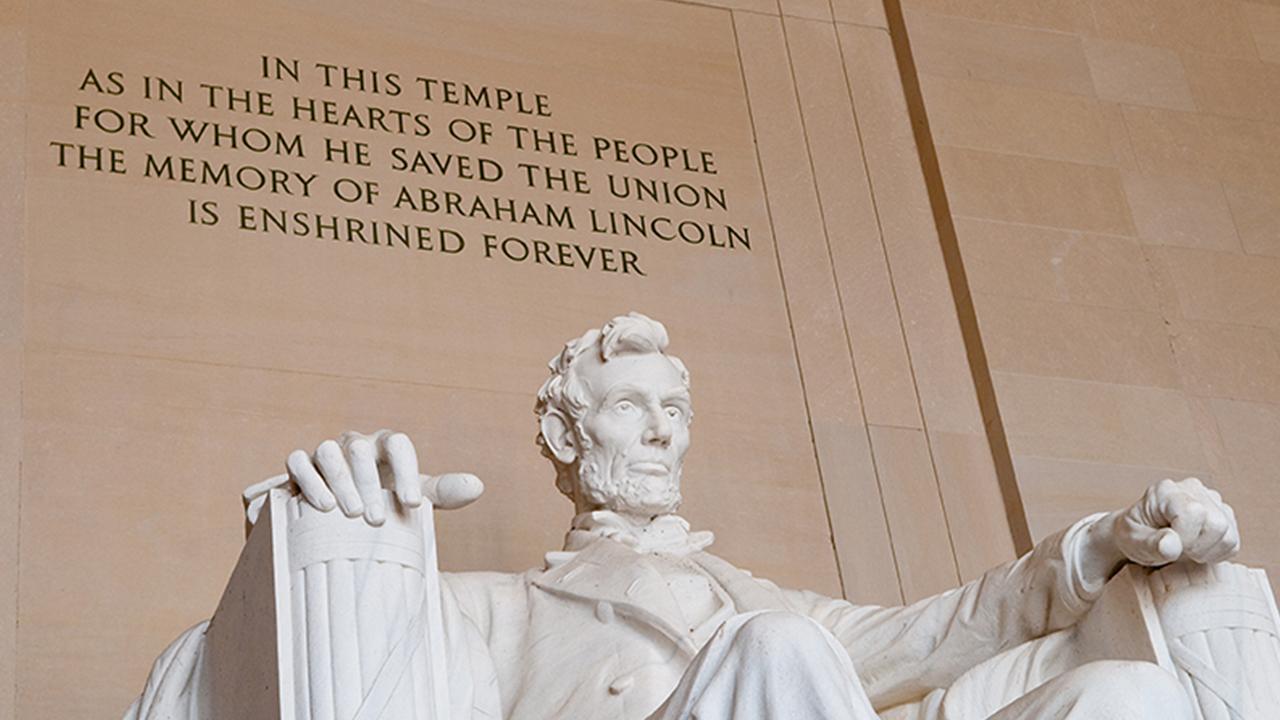
「人民の、人民による、人民のための政治」
独立メディア塾 編集部
エイブラハム・リンカーン(1809年2月12日~1865年4月15日)は、アメリカ合衆国の第16代大統領。ペンシルベニア州ゲティスバーグは南北戦争の激戦地。一時は兵士ら8,000人の遺体と腐った馬の死骸が散乱していた。1863年11月19日、リンカーンは国立軍人墓地の奉献式で演説した。「ゲティスバーグアドレス」と呼ばれて、歴史に残る演説になった。
奉献式の式次第によると、音楽や祈りに続いて追悼演説が予定されていた。演説の主は「エドワード・エヴェレット先生」。演説の後に「奉献の辞」として大統領が登場する。「リンカーンの3分間」によると「奉献の辞」は「現代の開通式でのテープカットのよう」なもので、長い演説を期待されていなかった。「ゲティスバーグアドレス」という歴史的タイトルは、本来、エヴェレットに与えられるべきだった、ということになる。
カメラマンたちはリンカーンがしばらくは演壇に立って演説をしているだろう、と落ち着き払っていた。ところが、あっという間に「歴史に残る演説」は終わってしまい、映像に残すことができなかった。
リンカーンは自身が役者でもあり、シェークスピアの一節を何時間も朗読する人物だった。語り口や効果的な抑揚のつけ方などを心得ていた。リンカーンの秘書官は、演説について当日の日記に「見事に淀みなく、いつになく寛いで語った」と記している。
リンカーンはこの演説で奴隷制度に触れていないが、1858年、連邦上院議員の議席を争った選挙で奴隷制度を巡って7回の公開討論を行った。米国が「半分は奴隷州、半分は自由州という状態」のままでは永久に続きはしない、分裂状態から脱出を、と訴える名演説を残した。リンカーンは選挙には敗れたが全国に名前が知られることになった。この「分裂した家」のはマルコム伝からの引用だが、リンカーンの言葉として有名になった。
「A house divided against itself cannot stand」
(分裂した家は立ち続けることができない)
リンカーンは1865年4月14日フォード劇場で妻と観劇中、北軍出身の俳優に後頭部を撃たれ、翌15日死亡した。
ゲティスバーグアドレスの全文(英語)
Four score and seven years ago our fathers brought forth on this continent, a new nation, conceived in Liberty, and dedicated to the proposition that all men are created equal.
Now we are engaged in a great civil war, testing whether that nation, or any nation so conceived and so dedicated, can long endure. We are met on a great battle-field of that war. We have come to dedicate a portion of that field, as a final resting place for those who here gave their lives that the nation might live. It is altogether fitting and proper that we should do this.
But, in a larger sense, we can not dedicate - we can not consecrate - we can not hallow - this ground. The brave men, living and dead, who struggled here, have consecrated it, far above our poor power to add or detract. The world will little note, nor long remember what we say here, but it can never forget what they did here. It is for us the living, rather, to be dedicated here to the unfinished work which they who fought here have thus far so nobly advanced. It is rather for us to be here dedicated to the great task remaining before us - that from these honored dead we take increased devotion to that cause for which they gave the last full measure of devotion - that we here highly resolve that these dead shall not have died in vain - that this nation, under God, shall have a new birth of freedom - and that government of the people, by the people, for the people, shall not perish from the earth.
なぜリンカーンの写真がないか?
1863年7月、ゲティスバーグの戦いで北軍が大きな勝利を収めた。11月19日の午後、奉献式では当時雄弁家として高名だった元国務長官エドワード・エヴェレットが2時間にわたる大演説を行った。これに対してリンカーンの演説はわずか3分、272語。リンカーンが立ち上がったとき、手にしていたのは1、2枚の紙きれだった。(「リンカーンの3分間」ゲリー・ウィルズ著から)奉献式の式次第によると、音楽や祈りに続いて追悼演説が予定されていた。演説の主は「エドワード・エヴェレット先生」。演説の後に「奉献の辞」として大統領が登場する。「リンカーンの3分間」によると「奉献の辞」は「現代の開通式でのテープカットのよう」なもので、長い演説を期待されていなかった。「ゲティスバーグアドレス」という歴史的タイトルは、本来、エヴェレットに与えられるべきだった、ということになる。
カメラマンたちはリンカーンがしばらくは演壇に立って演説をしているだろう、と落ち着き払っていた。ところが、あっという間に「歴史に残る演説」は終わってしまい、映像に残すことができなかった。
リンカーンは自身が役者でもあり、シェークスピアの一節を何時間も朗読する人物だった。語り口や効果的な抑揚のつけ方などを心得ていた。リンカーンの秘書官は、演説について当日の日記に「見事に淀みなく、いつになく寛いで語った」と記している。
リンカーンはこの演説で奴隷制度に触れていないが、1858年、連邦上院議員の議席を争った選挙で奴隷制度を巡って7回の公開討論を行った。米国が「半分は奴隷州、半分は自由州という状態」のままでは永久に続きはしない、分裂状態から脱出を、と訴える名演説を残した。リンカーンは選挙には敗れたが全国に名前が知られることになった。この「分裂した家」のはマルコム伝からの引用だが、リンカーンの言葉として有名になった。
「A house divided against itself cannot stand」
(分裂した家は立ち続けることができない)
リンカーンは1865年4月14日フォード劇場で妻と観劇中、北軍出身の俳優に後頭部を撃たれ、翌15日死亡した。
◇
ゲティスバーグアドレスの全文(英語)
Four score and seven years ago our fathers brought forth on this continent, a new nation, conceived in Liberty, and dedicated to the proposition that all men are created equal.
Now we are engaged in a great civil war, testing whether that nation, or any nation so conceived and so dedicated, can long endure. We are met on a great battle-field of that war. We have come to dedicate a portion of that field, as a final resting place for those who here gave their lives that the nation might live. It is altogether fitting and proper that we should do this.
But, in a larger sense, we can not dedicate - we can not consecrate - we can not hallow - this ground. The brave men, living and dead, who struggled here, have consecrated it, far above our poor power to add or detract. The world will little note, nor long remember what we say here, but it can never forget what they did here. It is for us the living, rather, to be dedicated here to the unfinished work which they who fought here have thus far so nobly advanced. It is rather for us to be here dedicated to the great task remaining before us - that from these honored dead we take increased devotion to that cause for which they gave the last full measure of devotion - that we here highly resolve that these dead shall not have died in vain - that this nation, under God, shall have a new birth of freedom - and that government of the people, by the people, for the people, shall not perish from the earth.


